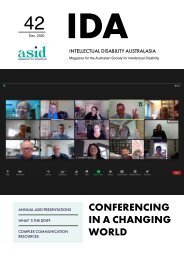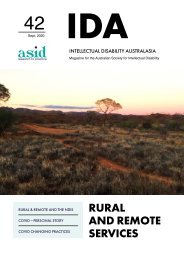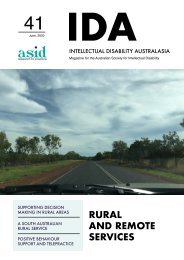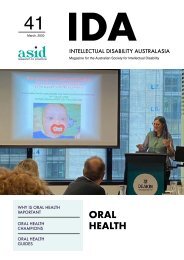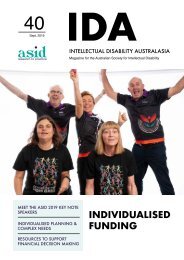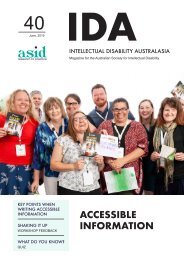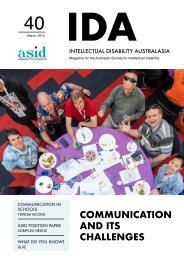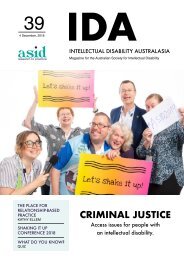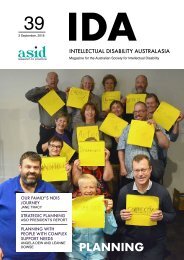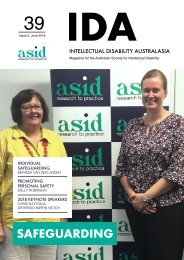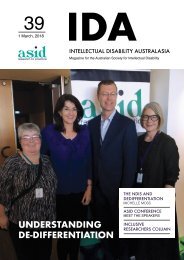IDA Vol 40 Issue 4 - ASID (Dec 2019)
You also want an ePaper? Increase the reach of your titles
YUMPU automatically turns print PDFs into web optimized ePapers that Google loves.
<strong>ASID</strong> <strong>2019</strong> CONFERENCE<br />
Professor Patricia O’Brien<br />
First, I deeply value what <strong>ASID</strong> stands for, which is to work<br />
with and alongside people with intellectual disability in finding<br />
ways that lead to quality lives; secondly, <strong>ASID</strong> has been a<br />
travelling companion throughout my career providing me with<br />
a strong ethical compass that has come from participating in<br />
its activities over many years.<br />
<strong>ASID</strong> is a deep well of knowledge, held in its journals, its<br />
position papers, conference presentations and more recently<br />
its webinairs which I have incorporated in my own research<br />
and practice over many years. To be recognised now by such<br />
an organisation is humbling.<br />
It also means a lot to me to be honoured by a group that has<br />
Professor Patricia O’Brien receiving<br />
given such leadership in the field of disability over 50 years<br />
Fellow <strong>ASID</strong> award presented by<br />
going back to its early days of AGSOMD/ASSID. If you scan<br />
Laura Hogan President <strong>ASID</strong><br />
its journal content, conference titles you will see that <strong>ASID</strong> has<br />
always been at the cutting edge of change. <strong>ASID</strong> has succeeded in raising membership awareness of<br />
ways to move forward in the provision of better lives for people with intellectual disability through its early<br />
recognition of the implications of normalisation, quality of life, self determination, supported decision<br />
making, active support, positive behaviour support to name only a few examples of its focus.<br />
<strong>ASID</strong> has not only provided me with scholarly viewpoints but also with a peer group that has supported<br />
me in clarifying my ideas associated with my practice. For example, when I worked on a large<br />
deinstitutionalisation project in New Zealand I was able to make contact with other members of <strong>ASID</strong> who<br />
similarly were working on such initiatives in Australia. Such networks have also been important to my coresearchers<br />
and me in my current work associated with both inclusive education and inclusive research.<br />
Finally the leadership that <strong>ASID</strong> has given over the recent decades in promoting the work of self<br />
advocates I am proud to be aligned with. In my early years of working in the field the visibility of people<br />
with intellectual disability at conferences and public meetings was low. <strong>ASID</strong> has changed that as can be<br />
seen by the participation of people with intellectual disability in the programme at the recent Conference<br />
in Adelaide.<br />
Thank you to the Board of <strong>ASID</strong>, to my peers that have nominated me and people in the field who have<br />
supported me. I will use the honorary tile of F<strong>ASID</strong> with great pride. Thank you for this recognition.<br />
Patricia O’Brien<br />
Professor of Disability Studies<br />
Sydney Medical School<br />
Centre for Disability Studies<br />
<strong>Vol</strong> <strong>40</strong>, <strong>Issue</strong> 4, <strong>Dec</strong>ember <strong>2019</strong><br />
23




